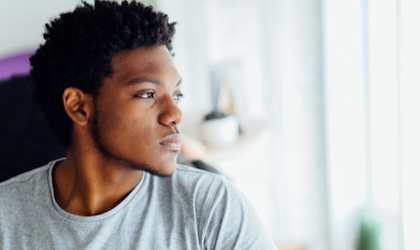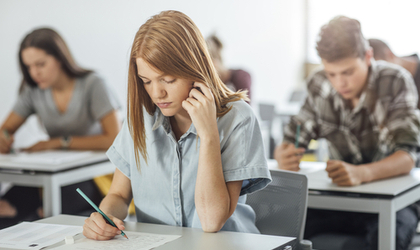
Sleep can often take a backseat during study season. There’s always the lingering temptation to pull all-nighters to cram in last-minute revision. And no wonder – rest tends to be the neglected stepsister in the health conversation. But this narrative misses the mark completely. In truth, sleep is the elixir of life; it’s the Swiss army knife of health. And getting quality rest every night is the single most effective thing you can do to support your emotional and cognitive health as you revise, especially when it comes to dealing with exam stress.
Sleeping for productivity
Sleep is the ‘Archimedes lever’ of health – the one thing that will raise all of the other singular health boats on the tide. A good night’s sleep can improve your recall, cognitive functioning, productivity, energy levels, and overall sense of wellbeing (1). In short, clocking enough zzz’s is the best (free) performance-enhancing drug for your exams.
Give yourself a good ‘sleep opportunity window’
Sleeping doesn’t make you slothful, lazy, or idle. In fact, as a teenager, you need significantly more sleep than adults – around 10-14 hours each night. And to achieve the minimum amount of sleep, you need to give yourself the right ‘sleep opportunity window’. Since most healthy people have a sleep efficiency of 85-90 per cent – and spend 10-15 per cent awake each night – this means you’ll need to be in bed for around 11 hours 45 minutes if you want a minimum of 10 hours sleep each night.
What is REM sleep?
There are two phases of sleep: non-rapid eye movement (NREM) sleep and rapid eye movement (REM) sleep. In the first half of the night, you get a lot of deep NREM sleep. But in the second half of the night, especially around the early hours of the morning, you get more REM sleep.
Why is it important during exam season?
Well, REM sleep is the principal stage in which you dream. REM sleep dreaming is a form of emotional first aid; it provides overnight mental health therapy, which is extremely important if you find exam season stressful. REM sleep also supports the consolidation of long-term memories, meaning it’s essential for the processing and storing of information learnt through your revision.
How does caffeine affect your sleep?
Use caffeine wisely. If you need an injection of caffeine to power you through a day of revision, you’re certainly not alone. But, alas, caffeine is no friend of sleep; it’s a stimulant. And it’s not just the dose; it’s also the timing that makes the poison. Try to have your caffeine before midday in mild to moderate amounts (ideally, less than 3 cups of coffee daily). Caffeine can impact your sleep in many ways: firstly, it makes it harder to fall asleep; secondly, it makes sleep more fragile (meaning you’re more susceptible to waking up throughout the night); thirdly, it affects the electrical brainwave quality of sleep (meaning you’ll experience more shallow sleep instead of deep sleep) (2). In fact, it’s important to remember that what you eat and drink during exam season can greatly affect your revision as well as your sleep.
What does blue light do to your sleep?
It’s a well-established fact that the blue light emitted from electronic devices can sabotage sleep. Twilight-TV-watching and social media scrolling interfere with the body’s natural production of melatonin, colloquially known as the ‘sleep hormone’, which is activated by darkness. An evening of blue-light exposure can make it harder for you to fall asleep and experience a full night of rest. Consider setting a curfew and disconnecting from all devices 90 minutes before bed. Try to make your bedroom a totally tech-free zone. If you really feel the urge to bring your phone to bed, tell yourself that you can only use it in the bedroom when standing up. Trust us; you’ll be less inclined to scroll at night with your comfy bed so close.
Quick-fire sleep tips
-
Set an alarm to prompt you to start getting ready for bed.
-
Try to wake up and go to bed at the same time each day.
-
Follow a relaxing wind-down routine one hour before bed.
-
Ensure your bedroom is dark, temperate, and quiet.
-
Aim to have eaten your dinner and exercised by 7pm.
-
Remove all clock faces from your bedroom.
-
Don’t count sheep! Take yourself on a visual walk instead.
-
If you can’t fall asleep within 25 minutes, get out of bed and head to a different room. In dim light, do some gentle stretching, yoga, or reading until you feel sleepy. Don’t check your phone!
Explore our range:
Supplements for boys and teenagers
Supplements for girls and teenagers
Supplements for young women
Supplements for young men
References
-
Sleep & Job Performance: Can Sleep Deprivation Hurt Your Work? (2021, January 8). Sleep Foundation. https://www.sleepfoundation.org/sleep-hygiene/good-sleep-and-job-performance
-
Caffeine’s Connection to Sleep Problems. (2021, January 22). Sleep Foundation. https://www.sleep foundation.org/nutrition/caffeine-and-sleep
Related Posts
Disclaimer: The information presented by Nature's Best is for informational purposes only. It is based on scientific studies (human, animal, or in vitro), clinical experience, or traditional usage as cited in each article. The results reported may not necessarily occur in all individuals. Self-treatment is not recommended for life-threatening conditions that require medical treatment under a doctor's care. For many of the conditions discussed, treatment with prescription or over the counter medication is also available. Consult your doctor, practitioner, and/or pharmacist for any health problem and before using any supplements or before making any changes in prescribed medications.

Keri
Keri Filtness has worked in the Nutrition Industry for 19 years. She is regularly called upon for her professional comments on health and nutrition related news. Her opinions have been featured by BBC3, Prima, Vitality, The Mirror, Woman’s Own and Cycling Weekly, amongst others. She has also worked one to one with journalists, analysing their diets and health concerns and recommending changes and additions, where appropriate.



